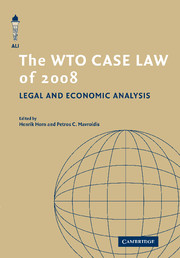Book contents
- Frontmatter
- Contents
- Foreword
- Introduction
- Appellate Body Report in EC–Bananas III: waiver-thin, or lock, stock, and metric ton?
- Guilt by association: US – Measures Relating to Shrimp from Thailand and US – Customs Bond Directive for Merchandise Subject to Anti-Dumping/Countervailing Duties
- Mexico–Olive Oil: Remedy without a cause?
- US–Stainless Steel (Mexico)
- Continued Suspense: EC–Hormones and WTO Disciplines on Discrimination and Domestic Regulation
- United States – Subsidies on Upland Cotton Recourse to Article 21.5 by Brazil
- China – Measures Affecting Imports of Automobile Parts
- India – Additional and Extra-Additional Duties on Imports from the United States
- Comment: India – Additional and Extra-Additional Duties on Imports from the United States
China – Measures Affecting Imports of Automobile Parts
Published online by Cambridge University Press: 07 September 2011
- Frontmatter
- Contents
- Foreword
- Introduction
- Appellate Body Report in EC–Bananas III: waiver-thin, or lock, stock, and metric ton?
- Guilt by association: US – Measures Relating to Shrimp from Thailand and US – Customs Bond Directive for Merchandise Subject to Anti-Dumping/Countervailing Duties
- Mexico–Olive Oil: Remedy without a cause?
- US–Stainless Steel (Mexico)
- Continued Suspense: EC–Hormones and WTO Disciplines on Discrimination and Domestic Regulation
- United States – Subsidies on Upland Cotton Recourse to Article 21.5 by Brazil
- China – Measures Affecting Imports of Automobile Parts
- India – Additional and Extra-Additional Duties on Imports from the United States
- Comment: India – Additional and Extra-Additional Duties on Imports from the United States
Summary
Abstract: This paper reviews the WTO Appellate Body Report on China – Measures Affecting Imports of Automobile Parts (WT/DS342/AB/R, 15 December 2008). This dispute concerns a set of regulatory measures imposing a 25% ‘charge’ on imported automobile parts used in the manufacture of motor vehicles in China. The main legal question in this case consisted of the nature of this charge as either a border charge subject to China's tariff concessions or an internal charge, subject to the basic nondiscrimination requirement of GATT Article III. In our report, we examine the reasoning of the Appellate Body relating to the difference between these two types of charges. We discuss the role and relevance of this distinction in the GATT/WTO legal system in general, and for the purposes of resolving this dispute in particular. We also address the important systemic question relating to the review of a Member's domestic laws for purposes of determining their GATT/WTO consistency. This was an important issue in this case, as China claimed that the Panel misunderstood the meaning of the relevant Decree and requested the Appellate Body to review the Panel's erroneous reading of this Decree. We discuss the Appellate Body's reasoning relating to the review of domestic laws by Panels and the Appellate Body and express concern over the distinction drawn by the Appellate Body between legal and factual elements of relevance in the interpretation of such laws.
- Type
- Chapter
- Information
- The WTO Case Law of 2008 , pp. 201 - 238Publisher: Cambridge University PressPrint publication year: 2010



